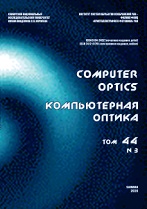|
Эта публикация цитируется в 10 научных статьях (всего в 10 статьях)
ОБРАБОТКА ИЗОБРАЖЕНИЙ, РАСПОЗНАВАНИЕ ОБРАЗОВ
FaceDetectNet: face detection via fully-convolutional network
V. S. Gorbatsevicha, A. S. Moiseenkoab, Yu. V. Viziltera
a State Research Institute of Aviation Systems (GosNIIAS), Moscow, Russia
b Moscow Institute of Physics and Technology (MIPT), Moscow, Russia
Аннотация:
Face detection is one of the most popular computer vision tasks. There are a lot of face detection approaches proposed including different CNN-based techniques, but the problem of optimal balancing between detection quality and computational speed is still relevant. In this paper we propose new CNN-based solution for face detection called FaceDetectNet. Our CNN architecture is based on ideas of YOLO/DetectNet and GoogleNet architecture supported with some new tools and implementation details created especially for our face detection application. We propose: original iterative proposal clustering (IPC) algorithm for aggregation of output face proposals formed by CNN and the 2-level “weak pyramid” providing better detection quality on the testing sets containing both small and huge images. Our face detection approach is close to previously proposed SSD-based face detection, but the principal difference is that we use the deep features of top hidden CNN layer for forming the face proposals of any size. Thus we utilize the global semantic and context information for improving the detection quality for small faces. Our FaceDetectNet is trained and tested on the most challenging WIDER FACE detection benchmark. Our algorithm achieves the average precision (AP) 0.69 on the WIDER FACE hard level, and thus outperforms all competitive detectors on the Hard level besides the HR state-of-the-art solution. Note that HR solution is based on essentially deeper and slower CNN, while our FaceDetectNet can work in real-time on the NVIDIA GeForce 1080 GPU. On the other hand, SSD-based face detector with comparable CNN parameters provides AP 0.625 only on the WIDER FACE hard level. So, our approach provides the best quality with reasonable computational speed.
Ключевые слова:
CNN, face detection, DetectNet, YOLO.
Поступила в редакцию: 07.12.2017
Принята в печать: 30.10.2018
Образец цитирования:
V. S. Gorbatsevich, A. S. Moiseenko, Yu. V. Vizilter, “FaceDetectNet: face detection via fully-convolutional network”, Компьютерная оптика, 43:1 (2019), 63–71
Образцы ссылок на эту страницу:
https://www.mathnet.ru/rus/co604 https://www.mathnet.ru/rus/co/v43/i1/p63
|

| Статистика просмотров: |
| Страница аннотации: | 214 | | PDF полного текста: | 131 | | Список литературы: | 27 |
|




 Обратная связь:
Обратная связь: Пользовательское соглашение
Пользовательское соглашение
 Регистрация посетителей портала
Регистрация посетителей портала Логотипы
Логотипы








 Цитирование в формате
Цитирование в формате 
